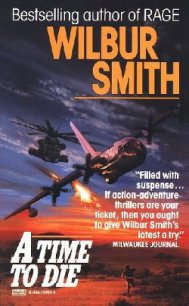Eagle in the Sky - Smith Wilbur (бесплатные версии книг .txt) 📗
coordination - after all the Brig must be well into his fifties, and
David allowed himself to contemplate such immense age with awe.
They took the main highway west towards Tel Aviv, and the Brig broke a
long silence.
I spoke with your old C. O. last night. He was surprised to hear
where you were. He tells me that you were offered promotion to staff
rank before you left -'It was a bribe, said David, and the Brig nodded
and began to talk. David listened to him quietly while he watched with
pleasure the quickly changing landscape as they came down out of the
hills and turned southwards through the low rolling plains towards
Beersheba and the desert.
I am taking you to an airforce base, and I might add that I am flouting
all sorts of security regulations to do so. Rastus assured me that you
can fly, and I want to see if he was telling me the truth David looked
at him quickly.
We are going to fly? 'and he felt a deep and pleasurable excitement
when the Brig nodded.
We are at war here, so you will be flying a combat sortie, and breaking
just about every regulation in the book. But you'll find we don't go by
the book very much. He went on quietly, explaining his own particular
view of Israel, its struggle and its chances of success, and David
remembered odd phrases he used. - We are building a nation, and the
blood we have been forced to mix into the foundations has strengthened
them - - We don't want to make this merely a sanctuary for all the
beaten-up Jews of the world. We want the strong bright Jews also -,
There are three million of us, and one hundred and fifty million
enemies, sworn to our total annihilation -'- if they lose a battle, they
lose a few miles of desert, if we lose one we cease to exist - - We'll
have to give them one more beating. They won't accept the others. They
believe their ammunition was faulty in 1948, after Suez the lines were
restored so they lost nothing, and in 67 they think they were cheated.
We'll have to beat them one more time before they'll leave us alone, He
talked as to a friend or an ally and David was warmed by his trust, and
enlivened by the prospect of flying again.
A plantation of eucalyptus trees grew as a heavy screen alongside the
road, and the Brig slowed to a gate in the barbed wire fence and a sign
that proclaimed in both languages: Chaim Weissmann Agricultural
Experimental Centre. They turned on to the side road through the
plantation, and there was a secondary fence and a guard post amongst the
trees.
A guard at the gate checked the Brig's papers briefly, they clearly knew
him well. Then they drove on, emerging from the plantation into neatly
laid-out blocks of different cereal crops. David recognized oats,
barley, wheat and maize, all of it flourishing in the warm spring
sunshine. The roads between each field were surveyed long and straight
and paved with concrete that had been tinted to the colour of the
surrounding earth.
There was something unnatural in these smooth twomile long fairways
bisecting each other at right angles, and to David they were familiar.
The Brig saw his interest and nodded. Yes, he said, runways. We are
digging in, not to be taken by the same tactics we used in 67. David
pondered it while they drove rapidly towards a giant concrete grain silo
that stood tall in the distance.
In the fields, scarlet tractors were at work, and overhead irrigation
equipment threw graceful glittering ostrich feathers of spray into the
air.
They reached the concrete silo and the Brig drove the compact through
the wide doors of the barn-like building that abutted it. David was
startled to see the lines of buses and automobiles parked in neat lines
along the length of the barn. There was transport here for many
hundreds of men, and yet he had noticed less than a score of
tractor-drivers.
There were guards here again, in paratrooper uniform, and when the Brig
led David to the rounded bulk of the silo, he realized suddenly that it
was a dummy. A massive bomb-proof structure of solid concrete, housing
all the sophisticated communications and radar equipment of a modern
fighter base. It was combined control tower and plot for four full
squadrons of Mirage fighters, the Brig explained briefly as they entered
an elevator and sank below the earth.
They emerged into a reception area where again the Brig's papers were
examined, and a paratrooper major was called to pass David through, a
duty he performed reluctantly and at the Brig's insistence. Then the
Brig led David along a carpeted and air-conditioned underground tunnel
to the pilot's dressing-room. It was tiled and spotless, with showers
and toilets and lockers like a country club changing-room.
The Brig had ordered clothing for David, guessing his size and doing so
accurately. The orderly corporal had no trouble fitting him out in
overalls, boots, G-suit, gloves and helmet.
The Brig dressed from his own locker and both of them went through into
the ready room, moving stiffly in the constricting grip of the G-suits
and carrying their helmets under their arms.
The duty pilots looked up from chess games and magazines as they
entered, recognized the general and stood to greet him, but the
atmosphere was easy and informal.
The Brig made a small witticism and they all laughed and relaxed, while
he led David through into the briefing-room.
Swiftly, but without overlooking a detail, he outlined the patrol that
they would fly, and checked David out on radio procedure, aircraft
identification, and other parochial details.
All clear? he asked at last, and when David nodded, he went on,
Remember what I told you, we are at war.
Anything we find that doesn't belong to us we hit it, hard! All right?
Yes, sir.
It's been nice and quiet the last few weeks, but yesterday we had a
little trouble down near Em Yahav, a bit of nastiness with one of our
border patrols. So things are a little sensitive at the moment. He
picked up his helmet and map case then turned to face David, leaning
close to him and fixing him with those fierce brown and golden eyes.
It will be clear up there today, and when we get to forty thousand, you
will be able to see it all, every inch of it from Rosh Hanikra to Suez,
from Mount Herman to Eilat, and you will see how small it is and how
vulnerable to the enemies that surround us. You said you were looking
for something worthwhile, I want you to decide whether guarding the fate
of three million people might not be a worthwhile job for a man.
They rode on a small electric personnel carrier down one of the long
underground passages, and they entered the concrete bunker dispersed at
one point of a great star whose centre was the concrete silo, and they
climbed down from the cart.
The Mirages stood in a row, six of them, sleek and needle-nosed,
crouching like leashed and impatient animals, so well remembered in
outline, but vaguely unfamiliar in their desert brown and drab green
camouflage with the blue Star of David insignia on the fuselage.
The Brig signed for two machines, grinning as he wrote Butch Ben Yak
under David's numeral.
As good a name as any to fly under, he grunted. This is the land of the
pseudonym and alias. David settled into the tiny cockpit with a sense
of homecoming. In here it was all completely familiar and his hands




